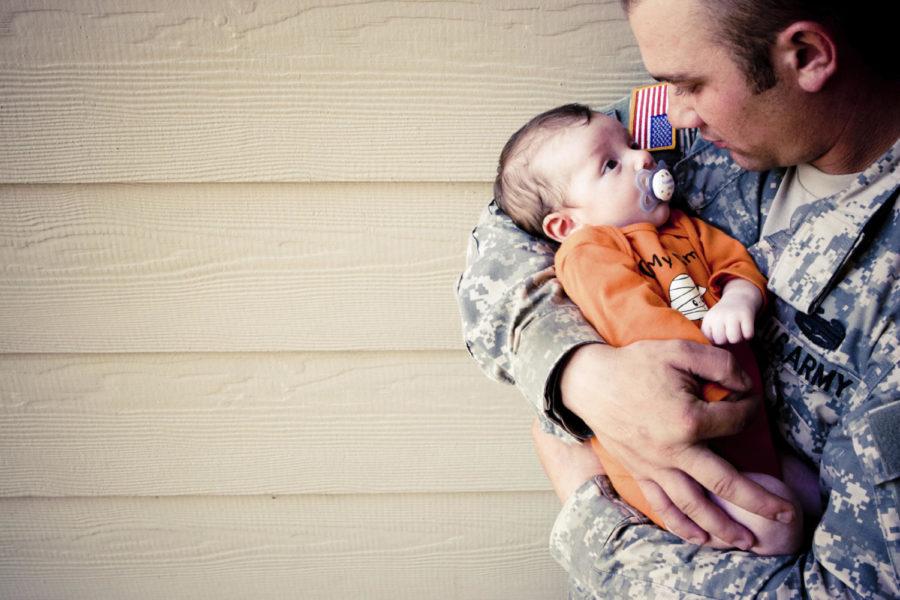Brase: Maternity, paternity leave should be equal in military
Paternity leave
February 17, 2016
After having a baby, most parents have the ability to be at home to feed their child, hear his or her first word and watch him or her walk for the first time. This isn’t the case for parents in the military.
As of January 2016, women in the military have 12 weeks of paid maternity leave, said Defense Secretary Ash Carter. While women have 12 weeks of leave, men only have 10 days. Because of this huge discrepancy in time, the Department of Defense is trying to increase leave to 14 days.
The department is attempting to be more family friendly. It has increased leave from 10 weeks to 12 weeks as an incentive to join or continue working for the military and to be seen as an organization that cares about its soldiers at work and at home. I’m not against women getting two more weeks with their child — the more the better — but I am against women receiving weeks while men receive days.
I would think the military would recognize teamwork, since that is how an army becomes an army. Parenting is teamwork too.
The American Academy of Pediatrics suggests only breast milk for the baby during the first six months of life, but then mixing breast milk and solid food until the child is 1 year old, according to Mayo Clinic.
A mother needs to be available to her child for an entire year to provide breast milk, but women in the military only have 12 weeks. Formulas and pumps are available, but breastfeeding provides the baby more than simple nutrients.
Breastfeeding fights germs that cause illnesses for the baby. Secretory immunoglobulin A puts a protective layer on the mucous membrane in the baby’s intestine, nose and throat when the mother produces milk.
Breastfeeding not only protects the baby but it also can prevent the mom from having postpartum depression and decreases stress levels. More than 9,000 studies by the National Institute of Health found that when women breastfeed, the hormone oxytocin is released into their body, which makes them relax.
Mothers can also suffer from postpartum depression when they go back to work or when they are deployed. I’m aware that soldiers have a chance of experiencing mental health problems after going through wars and being a part of their families, but my focus is maternity and paternity leave effects.
Unless they are in the Navy or Marines and pregnant at the time, a woman only has 12 weeks to spend with their newborn. Marines or sailors who are currently pregnant or become pregnant within 30 days of the new policy, have 18 weeks of paid maternity leave, according to the Department of Defense. If they become pregnant after the 30-day marker, they follow the 12-week time off policy.
I know these mothers have chosen the path of military service, which is honorable, but what if her husband is also in the military? The husband would only get to see his child for 10 days before leaving the mother to fend for herself during a time when her body is trying to recover from nine months of pregnancy and a delivery.
Another worrisome scenario is if the man or woman is a single parent. The father would only have 10 days to figure out a plan of who is going to care for his child, and the mother only 12 weeks. No matter the case, if one parent or both are in the military, it is unfair.
A father is vital in a child’s life because he can take care of and teach the child lessons. He can be the one his son will come to for advice, and he is the one his daughter will look up to as what she should look for in a future relationship, according to Happenings Magazine.
I absolutely agree with this. My mom and dad taught me different lessons. My brothers went to our dad for help about their cars. I’m not trying to be sexist, that was just one my dad’s main hobbies. As for me, I definitely looked up to my dad. Children form bonds with both parents, no matter their gender.
Women have an ability men do not — breastfeeding. But men have hands they can change a diaper with, a shoulder to comfort a crying baby and a brain to figure out how to take care of their child just like women. Just because women are the ones who give birth does not mean men should have less of a responsibility. It takes sperm to fertilize an egg, and guess who contributed to that? The man.
If the military family is close to base, that is great for them. However, some families go months without hearing from their loved ones.
The Department of Defense increased child care to 14 hours a day for everyone in the force who are at work and need someone to take care of their children.
This makes them seem more family oriented, but soldiers who are deployed do not have the luxury of seeing their family every day after work. For once, women have something men don’t — more time with their family. Yet, I believe in equal rights for both men and women, especially when it comes to caring for a child. A child should have as much love as he or she can when being welcomed into a new world.







